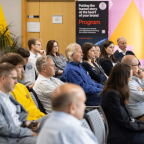
Bristol-based CFMS joins project to revolutionise aircraft testing
The Bristol-based Centre for Modelling & Simulation (CFMS) will join aerospace experts from across the UK in a landmark £10.54m project to transform how aircraft wings are tested.
The Smarter Testing initiative is jointly funded by the UK Government’s Aerospace Technology Institute Programme and led by Airbus Operations. The objective is to develop a new testing and certification process for aeronautical structures that will integrate virtual and physical testing and contribute towards a significant reduction in development lead-time and costs. The project aims to reduce the current seven-year cycle for large structures, such as aircraft wings, to just five years.
Smarter Testing will reshape the costly and time-consuming physical tests of today into systems which boast virtual and digital technologies, including Artificial Intelligence, Machine Learning algorithms and data-driven simulations.
As part of the consortium, CFMS experts will work with other industry leaders to apply artificial intelligence to transform the structural testing process of aircraft wings. The three-year project will draw on the expertise of each partner company to accelerate design and test automation.
Ian Risk, chief technology officer at CFMS, explained: “The current practice of conducting purely physical tests for large aerospace is both extremely timely and expensive. It requires large physical test rigs to be built and maintained over the life of an aircraft which can be in excess of 20 years. Our experience and expertise allow us to use digital technologies to highlight key areas for assessment, rather than monitoring at full system level. This also provides the basis for a digital twin – a digital version of the product – providing rigorous testing at a far lower capital cost than experienced today.”
CFMS’s engineers will help to develop a predictive model for aircraft component stress and Fatigue & Damage Tolerance (F&DT) by training machine learning algorithms to predict the onset of defects on aircraft panels. CFMS will use a combination of historic test data and simulated data to train the machine learning models and validate the predictions against the measured test data.
Risk added: “The process of virtual testing and the application of AI into engineering and manufacturing is one of the major capability developments identified by all industrial sectors to improve productivity, especially those sectors concerned with high value, complex products with a long-life expectancy. Such approaches will enable designers to more rigorously and rapidly evaluate new, radical product architectures and increase the levels of automation in design. Critically they provide improved insight and predictive capability to the design, test and manufacture of future products.”
CFMS joins Airbus Operations Ltd and the four other consortium partners on the Smarter Testing project: National Physical Laboratory (NPL), University of Liverpool, GOM UK Ltd., and Dassault Systems UK Ltd.







